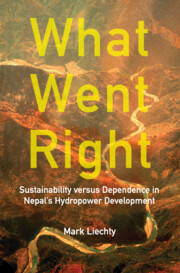Book contents
- Frontmatter
- Dedication
- Contents
- Preface
- Acknowledgments
- List of Abbreviations
- 1 A Corporate Vision: Business as Development Philosophy
- 2 The Butwal Technical Institute, Tinau, and the Origins of the Butwal Power Company
- 3 Andhi Khola
- 4 Jhimruk
- 5 The “Great Upheaval”: Khimti and the Limits of the Hoftun Hydropower Vision
- 6 Melamchi and the Rush to Privatization
- 7 Privatization: The Long Haul
- 8 The New BPC: Cultures in Conflict
- 9 Conclusion: From Seed, to Plant, to Seed
- Bibliography
- Index
- Miscellaneous Endmatter
Preface
Published online by Cambridge University Press: 23 April 2022
- Frontmatter
- Dedication
- Contents
- Preface
- Acknowledgments
- List of Abbreviations
- 1 A Corporate Vision: Business as Development Philosophy
- 2 The Butwal Technical Institute, Tinau, and the Origins of the Butwal Power Company
- 3 Andhi Khola
- 4 Jhimruk
- 5 The “Great Upheaval”: Khimti and the Limits of the Hoftun Hydropower Vision
- 6 Melamchi and the Rush to Privatization
- 7 Privatization: The Long Haul
- 8 The New BPC: Cultures in Conflict
- 9 Conclusion: From Seed, to Plant, to Seed
- Bibliography
- Index
- Miscellaneous Endmatter
Summary
Nepal's hydropower sector is one of the country's few development success stories. Nepal has engineering, construction, and manufacturing capabilities that drive a thriving national market in hydropower installation and production. While virtually every other comparable country in the “developing world” relies on foreign expertise and equipment, Nepali companies independently produce everything from simple water-powered grain mills to large-scale hydropower components, and from sophisticated hydraulic modeling services to skilled hydro-engineering and design services. Specialized Nepali construction firms draw on skilled Nepali labor to build large hydroelectric power plants of up to around 100 megawatts (MW) (Karki 2017: 122–123). Nepal has even begun to export these skills, services, and components to other parts of Asia and Africa (R. S. Shrestha et al. 2018: 6). Developments in Nepal's hydropower sector are still well behind those of advanced industrial economies, but they are also well ahead of other “least developed countries.” As a whole, Nepal has no other industrial sector that even comes close to the success of its hydropower industry.
This book examines the history of Nepal's hydropower sector to ask why it is the conspicuous exception to the rule of Nepal's woeful underdevelopment. The answer, I argue, lies in the story of the Butwal Power Company (BPC) and the antiestablishment development logic of its founder Odd Hoftun, a pioneering Norwegian development worker, missionary, and engineer. From the early 1960s onward, Hoftun insisted that Nepalis should develop technical skills needed to thrive in a modernizing society, a view that eventually led Hoftun to promote hydropower development as the means to literally power Nepal's industrial future. Counter to the then (and now) prevailing logic, Hoftun insisted that, to the extent possible, hydroelectric design, construction, and equipment should be locally sourced—even if it was, initially, crude and inefficient. Self-sufficiency and sustainability could only come, Hoftun argued, if every aspect of hydropower development could be done in Nepal, by Nepalis. In the face of ridicule from everyone—from foreign and Nepali peers to big international development agencies—Hoftun started small but, over the course of half a century, worked with Nepalis and other foreigners to establish a technical training institute and, gradually, a family of interlocking companies focused on hydrological design and engineering, equipment manufacturing, deep-mountain tunneling, and project installation.
- Type
- Chapter
- Information
- What Went RightSustainability Versus Dependence in Nepal's Hydropower Development, pp. xi - xivPublisher: Cambridge University PressPrint publication year: 2022



